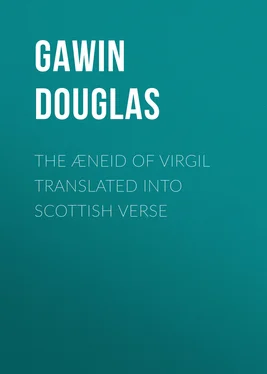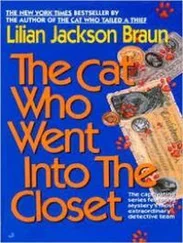Gawin Douglas - The Æneid of Virgil Translated Into Scottish Verse
Здесь есть возможность читать онлайн «Gawin Douglas - The Æneid of Virgil Translated Into Scottish Verse» — ознакомительный отрывок электронной книги совершенно бесплатно, а после прочтения отрывка купить полную версию. В некоторых случаях можно слушать аудио, скачать через торрент в формате fb2 и присутствует краткое содержание. Жанр: foreign_poetry, Поэзия, foreign_antique, foreign_prose, на английском языке. Описание произведения, (предисловие) а так же отзывы посетителей доступны на портале библиотеки ЛибКат.
- Название:The Æneid of Virgil Translated Into Scottish Verse
- Автор:
- Жанр:
- Год:неизвестен
- ISBN:нет данных
- Рейтинг книги:4 / 5. Голосов: 1
-
Избранное:Добавить в избранное
- Отзывы:
-
Ваша оценка:
- 80
- 1
- 2
- 3
- 4
- 5
The Æneid of Virgil Translated Into Scottish Verse: краткое содержание, описание и аннотация
Предлагаем к чтению аннотацию, описание, краткое содержание или предисловие (зависит от того, что написал сам автор книги «The Æneid of Virgil Translated Into Scottish Verse»). Если вы не нашли необходимую информацию о книге — напишите в комментариях, мы постараемся отыскать её.
The Æneid of Virgil Translated Into Scottish Verse — читать онлайн ознакомительный отрывок
Ниже представлен текст книги, разбитый по страницам. Система сохранения места последней прочитанной страницы, позволяет с удобством читать онлайн бесплатно книгу «The Æneid of Virgil Translated Into Scottish Verse», без необходимости каждый раз заново искать на чём Вы остановились. Поставьте закладку, и сможете в любой момент перейти на страницу, на которой закончили чтение.
Интервал:
Закладка:
Virgil
The Æneid of Virgil Translated Into Scottish Verse / Volumes 1 & 2
VOLUME I
INCIPIT PROLOGUS IN VIRGILII ENEADOS
Lawd, honour, praysyngis, thankis infynyte
To the and thy dulce ornat fresch endyte,
Maist reuerend Virgill, of Latyn poetis prynce,
Gem of engyne and flude of eloquens.
Thou peirles perle, patroun of poetry,
Roys, regester, palm, lawrer, and glory,
Chosyn charbukkil, cheif flour, and cedyr tre,
Lantarn, laid stern, myrrour, and A per se,
Maister of masteris, sweit sours, and spryngand well,
Wyde quhar our all rung is thyne hevynly bell;
I meyn thy crafty warkis curyus,
Sa quyk, lusty, and maist sentencyus,
Plesand, perfyte, and feilabill in all degre,
As quha the mater beheld tofor thar E;
In every volume quhilk the lyst do wryte,
Surmontyng fer all other maner endyte,
Lyke as the roys in June with her sweit smell
The mary guld or dasy doith excell.
Quhy suld I than, with dull forhed and vayn,
With rude engyne and barrand emptyve brayn,
With bad harsk spech and lewit barbour tong,
Presume to write quhar thy sweit bell is rung,
Or contyrfate sa precyus wordys deir?
Na, na, noth swa, bot kneill quhen I thame heir.
For quhat compair betwix myd day and nycht,
Or quhat compair betwix myrknes and lycht,
Or quhat compair is betwix blak and quhyte,
Far grettar difference betwix my blunt endyte
And thy scharp sugurate sang Virgiliane,
Sa wysly wrocht, with nevir a word invane.
My waverand wyt, my cunnyng febill at all,
My mynd mysty, thir may nocht mys a fall;
Stra for thys ignorant blabryng imperfyte,
Besyde thy polyst termys redymyte.
And netheles with support and correctioun,
For naturall lufe and frendely affectioun,
Quhilkis I beir to thy warkis and endyte;
All thocht, God wait, tharin I knaw full lyte;
And that thy facund sentence mycht be song
In our langage alsweill as Latyn tong,
Alsweill, na, na, impossibill war, per de;
Ȝit with thy leif, Virgill, to follow the,
I wald, into my rurall wlgar gros,
Wryte sum savoryng of thyne Eneados.
Bot fair I dreid forto disteyn the quyte,
Throu my corruppit cadens imperfyte;
Disteyn the, nay forsuyth, that may I nocht,
Weill may I schaw my burall bustuus thocht,
Bot thy wark sall endur in lawd and glory,
But spot or falt, condyng etern memory.
Thocht I offend, onwemmyt is thy fame,
Thyne is the thank, and myne salbe the schame.
Quha may thy versis follow in all degre,
In bewtie, sentence, and in grauite?
Nane is, nor was, ne ȝit salbe, trow I,
Had, has, or sal haue sic craft in poetry.
Of Helicon so drank thou dry the flude
That of thy copios fouth or plenitude,
All mon purches drynk at thy sugurit tun;
So lamp of day thou art and schynand son,
All otheris on fors mon thar lycht beg or borrow,
Thou art Vesper and the day stern at morow;
Thou Phebus lightnar of the planetis all,
I not quhat dewly I the clepe sall,
For thou art all, and sum, quhat nedis more,
Of Latyn poetis that sens was, or before.
Of the writis Macrobius, sans faill,
In hys gret volume clepit Saturnaill.
Thy sawys in sic eloquens doith fleit,
So inuentive of rethorik flowris sweit
Thou art, and has so hie profund sentens
Tharto perfyte but ony indigens,
That na lovyngis ma do incres thy fame,
Nor na reproche dymynew thy gud name.
Bot sen I am compellit the to translait,
And not only of my curage, God wait,
Durst interpryse syk owtrageus foly,
Quhar I offend the les reprefe serve I;
And that ȝe knaw at quhais instans I tuke
Forto translait this maist excellent buke,
I meyn Virgillis volume maist excellent,
Set this my wark full febill be of rent,
At the request of a lord of renown
Of ancistry nobill and illustir baroun,
Fader of bukis, protectour to sciens and lair,
My speciall gud lord Henry lord Sanct Clair,
Quhilk with gret instance, diuers tymys seir,
Prayt me translait Virgill or Homeir;
Quhais plesour suythly, as I undirstude,
As neir conjunct to his lordschip in blude,
So that me thocht hys request ane command,
Half disparit this wark I tuke on hand,
Nocht fully grantand nor anys sayand ȝee,
Bot only to assay quhou it mycht be.
Quha mycht gaynsay a lord so gentill and kynd,
That euer had ony curtasy in thar mynd,
Quhilk, besyde hys innatyve pollecy,
Humanyte, curage, fredome and chevalry,
Bukis to recollect, to reid and se,
Has gret delyte as euer had Ptholome?
Quharfor to hys nobilite and estait,
Quhatso it be, this buke I dedicait,
Writtin in the langage of Scottis natioun,
And thus I mak my protestatioun.
Fyrst I protest, beaw schirris, be ȝour leif,
Beis weill avisit my wark or ȝhe repreif;
Consider it warly, reid oftar than anys,
Weill at a blenk sle poetry nocht tayn is;
And ȝit forsuyth I set my bissy pane,
As that I couth, to mak it braid and plane,
Kepand na sudron bot our awyn langage,
And spekis as I lernyt quhen I was page.
Nor ȝit sa cleyn all sudron I refus,
Bot sum word I pronunce as nyghtbouris doys;
Lyke as in Latyn beyn Grew termys sum,
So me behufyt quhilum, or than be dum,
Sum bastard Latyn, Franch, or Inglys oys,
Quhar scant was Scottis, I had nane other choys.
Nocht for our tung is in the selwyn skant,
Bot for that I the fowth of langage want,
Quhar as the cullour of his properte
To kepe the sentens tharto constrenyt me,
Or than to mak my sayng schort sum tyme,
Mair compendyus, or to lykly my ryme.
Tharfor gude frendis, for a gymp or a bourd,
I pray ȝou note me nocht at euery word.
The worthy clerk hecht Lawrens of the Vaill,
Amang Latynys a gret patron sans faill,
Grantis quhen twelf ȝheris he had beyn diligent
To study Virgill, skant knew he quhat he ment;
Than thou or I, my frend, quhen we best weyn
To haue Virgil red, vnderstand, and seyn,
The rycht sentens perchance is fer to seik;
This wark twelf ȝheris first was in makyng eyk,
And nocht correct quhen the poet gan deces;
Thus for small faltis my wys frend hald thy pes.
Adherdand to my protestatioun,
Thocht Wilȝame Caxtoun, of Inglis natioun,
In proys hes prent are buke of Inglis gros,
Clepand it Virgill in Eneados,
Quhilk that he says of Franch he did translait,
It has na thing ado tharwith, God wait,
Ne na mair lyke than the devill and Sanct Austyne;
Haue he na thank tharfor, bot loys hys pyne,
So schamefully that story dyd pervert;
I red hys wark with harmys at my hart,
That syk a buke, but sentens or engyne,
Suldbe intitillit eftir the poet dyvyne;
His ornate goldyn versis, mair than gilt,
I spittit for dispyte to se swa spilt
With sych a wyght, quhilk trewly, be myne entent,
Knew neuer thre wordis at all quhat Virgill ment:
Sa fer he chowpis I am constrenyt to flyte.
The thre first bukis he has ourhippyt quyte,
Salfand a litill twychyng Polidorus,
And the tempest furth sent by Eolus,
And that full sempilly on hys awyn gys;
Virgill thame wrait all on ane other wys.
For Caxton puttis in hys buke out of toyn,
The storm furth sent by Eolus and Neptune;
Bot quha sa redis Virgill suythfastly,
Sall fynd Neptune salf Eneas navy.
Me lyst nocht schaw quhou thystory of Dydo,
Be this Caxtoun is haill pervertit so,
That besyde quhar he fenys to follow Bocas,
He rynnys sa fer from Virgill in mony place,
On sa prolixt and tedyus fasson,
So that the ferd buke of Eneadon,
Twichand the lufe and ded of Dido queyn,
The twa part of his volume doith conteyn,
That in the text of Virgill, trastis me,
The twelt part scars contenys, as ȝe may se.
The fyfte buke of the festis funerall,
The lusty gammys, and plays palustrall,
Интервал:
Закладка:
Похожие книги на «The Æneid of Virgil Translated Into Scottish Verse»
Представляем Вашему вниманию похожие книги на «The Æneid of Virgil Translated Into Scottish Verse» списком для выбора. Мы отобрали схожую по названию и смыслу литературу в надежде предоставить читателям больше вариантов отыскать новые, интересные, ещё непрочитанные произведения.
Обсуждение, отзывы о книге «The Æneid of Virgil Translated Into Scottish Verse» и просто собственные мнения читателей. Оставьте ваши комментарии, напишите, что Вы думаете о произведении, его смысле или главных героях. Укажите что конкретно понравилось, а что нет, и почему Вы так считаете.












